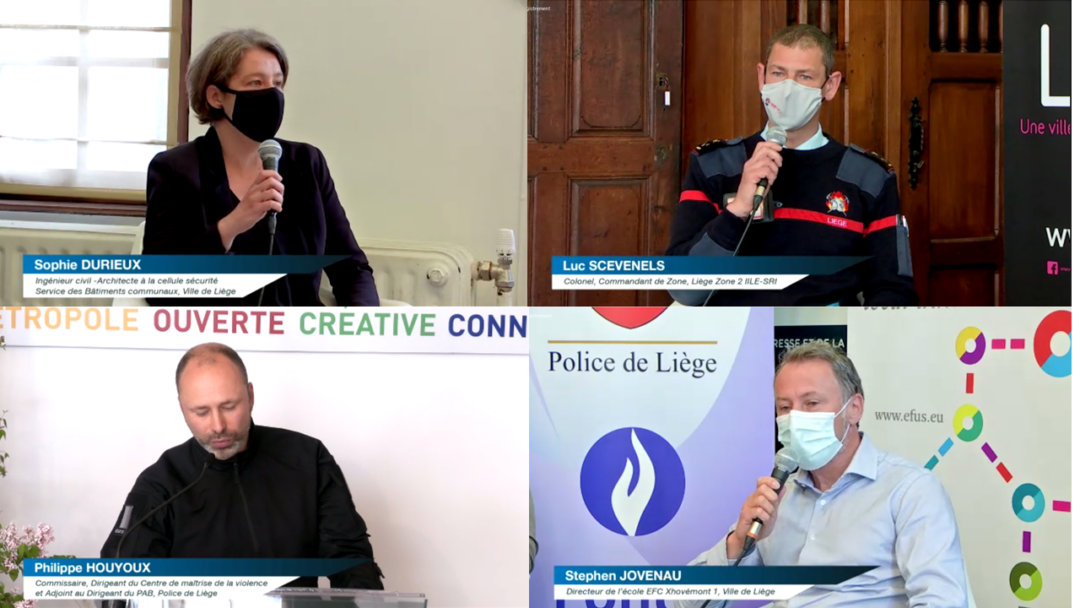Home to some 600,000 people, Riga is the capital of Latvia, in the north-east of Europe. Situated on the Spanish Costa Blanca, Xàbia has a population of some 27,000. We’ve asked these two very different cities what they expect from their participation in Secu4All.
What are the main security challenges regarding your public spaces and how can Secu4All contribute to addressing them?
Riga, Staņislavs Šeiko, Strategic planning chief specialist at the Riga Municipal Police: Our main challenge is to create safe public spaces, not so much in the old city centre but rather in the suburbs and surrounding areas. We need to strike a balance between security through environmental design and CCTV and the right to privacy. Creating such safe areas involves complex measures: on the one hand protective solutions against crime and minor offences, and on the other security measures against terrorism and threats linked to modern technologies, such as drones and e-scooters. The main stakeholders in this respect are the municipal police and the municipal departments of strategic urban planning and of the environment. Even though they are all under the jurisdiction of the municipality, there is a certain lack of communication and partnership between them.
Xàbia, Fernando Gaona de Sande, Deputy Headquarters & Security Advisor Supervisor, European Projects Coordinator at the Xàbia Municipal Police:
Xàbia is a tourist city that receives large numbers of visitors at different periods during the year. This means that the size of the local population varies greatly according to the seasons, and that our local resources can be overwhelmed during the high season. As a coastal and tourist city, we also must be prepared to face external threats, such as terrorism, organised crime, drug trafficking, etc., as well as local crime which, although very low, exists and must be appropriately treated.
Several organisations manage security in our city: the City Council – municipal police, civil protection and emergency department –, the Civil Guard (national police), and the regional police. Even though they are committed to working in close cooperation regarding security and emergencies, there are sometimes problems linked to a lack of joint training and of fluidity in the exchange of information.
What is your current approach regarding the use of technology for security in public spaces? How does Secu4All fit with it?
Riga: The City of Riga has been using CCTV to monitor the security of public spaces for 15 years now and it’s been a success. We currently have a network of about 200 cameras, which we plan to double to about 450. Since the system works well, there is no need to convince the public or the government of its benefits. We are also planning to use drone technologies and Artificial Intelligence (AI) in our CCTV network. As technologies change, new challenges emerge and Secu4All can provide us with examples of the latest promising practices. Also, it gives us the opportunities to share our solutions and ideas.
What do you expect from your participation in Secu4All?
Riga: Since we are going to need AI to manage our future network of 450 CCTV cameras, we hope that the project will give us insights as to which AI technologies to implement. Furthermore, we are planning to centralize all the technologies we use for the security of public spaces, such as traffic lights, CCTV and flood sensors, into one police coordination centre and to make Riga a smart city. We hope the project will provide us with good working models or practices. In the short term, we expect it will give us a comprehensive risk assessment of our approach, but further down the line, we are keen to receive a vulnerability assessment of our public spaces.
Also, the municipality is working on Crime Prevention Through Environmental Design (CPTED), but we are lacking knowledge in this respect so we hope the project will provide us with information and useful tools.
What aspects of Secu4All could bring added value to your existing activities regarding the security of public spaces?
Xàbia: Through the Secu4All training modules, we can improve our ability to involve different sectors and stakeholders in the field of security and to work together in order to improve the protection of public spaces.
The Xàbia City Council and the Police Department recognise the importance of thorough planning and risk assessment and the value of deploying new technologies in conjunction with adequate urban planning in order to improve the accessibility, safety and enjoyment of the public spaces.
Where do you see potential challenges for Secu4All?
Xàbia: Secu4All is an excellent proposal to create models and practical training guides that link different types of key actors in potential emergency situations.
The potential challenges may be in mixing public and private sector actors in a joint training programme, and in establishing fluid communication channels between different municipal departments or security stakeholders.





